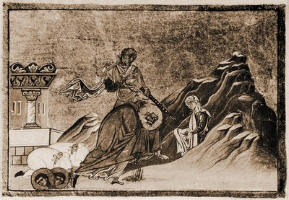
The Works Of Dionysius The Areopagite Volumes 1 & 2
SECTION XI
This then is sufficient on these matters, let us now advance to the purpose of the discourse by unfolding, to the best of our ability, the kindred and common Names of the Divine distinction. And, in order that we may first distinctly define everything, in order, we call Divine distinction, as we have said, the goodly progressions of the Godhead. For, by being given to all things existing, and pouring forth the whole imparted goods in abundance, It is distinguished uniformly, and multiplied uniquely, and is moulded into many from the One, whilst being self-centred. For example, since Almighty God is superessentially Being, but the Being is bequeathed to things being, and produces the whole Essences; that One Being is said to be fashioned in many forms, by the production from Itself of the many beings, whilst It remains undiminished, and One in the multiplicity, and Unified during the progression, and complete in the distinction, both by being superessentially exalted above all beings, and by the unique production of the whole; and by the unlessened stream of His undiminished distributions. Further, being One, and having distributed the One, both to every part and whole, both to one and to multitude, He is One, as it were, superessentially, being neither a part of the multitude, nor whole from parts; and thus is neither one, nor partakes of one, nor has the one. But, beyond these, He is One, above the one, to things existing—One, and multitude indivisible, unfilled superfulness, producing and perfecting and sustaining every one thing and multitude. Again, by the Deification from Itself, by the Divine likeness of many who become gods, according to their several capacity, there seems, and is said to be, a distinction and multiplication of the One God, but He is none the less the Supreme God, and super-God, superessentially One God,—undivided in things divided, unified in Himself, both unmingled and unmultiplied in the many. And when the common conductor of ourselves, and of our leader to the Divine gift of light,—he, who is great in Divine mysteries—the light of the world—had thought out this in a manner above natural ability,—he speaks as follows, from the inspiration of God, in his sacred writings—“For, even if there are who are called gods, whether in heaven or upon earth, as there are gods many and lords many; but to us there is One God, the Father, from Whom are all things, and we unto Him,—and One Lord Jesus Christ, through Whom are all things, and we, through Him.” For, with regard to things Divine, the unions overrule the distinctions, and precede them, and are none the less unified, even after the self-centred and unified distinction. These, the mutual and common distinctions, or rather the goodly progressions of the whole Deity, we will endeavour to the best of our ability to celebrate from the Names of God, which make them known in the Oracles;—first, having laid down, as we have said, that every beneficent Name of God, to whichever of the supremely Divine Persons it may be applied, is to be understood with reference to the whole Supremely Divine wholeness unreservedly.

 Keep Site Running
Keep Site Running